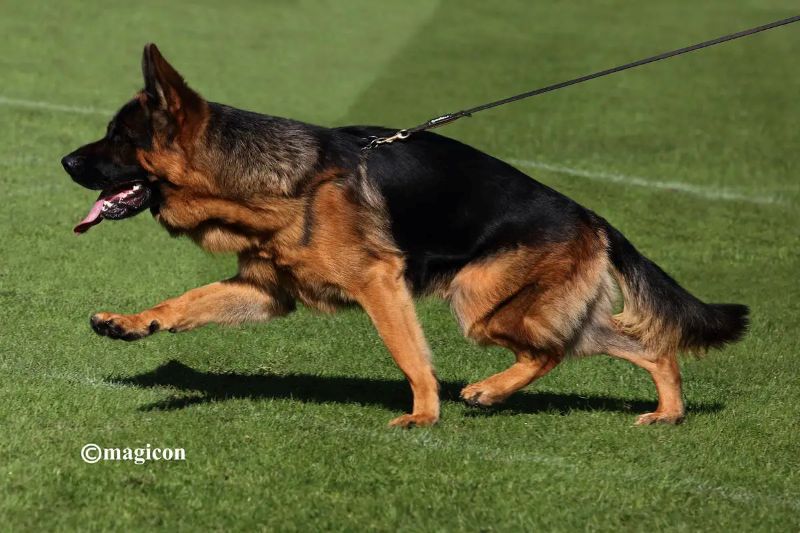German Shepherds are known for their intelligence, loyalty, and protective instincts. They have earned their place as a top choice for family pets and working dogs. Whether as service animals, police dogs, or loyal companions, German Shepherds excel in various roles, making them ideal for many dog lovers.
This article will explore the importance of pedigrees in German Shepherd breeding and how they affect the dog’s overall quality. We will also discuss why pedigree is essential for anyone looking to adopt or purchase a German Shepherd.

A Pedigree Role In German Shepherd Breeding
A pedigree offers a detailed family history, such as information about a German Shepherd’s health, temperament, and physical traits. Choosing a puppy with a strong pedigree is necessary if you’re seeking a healthy, well-behaved, and high-performing companion.
Definition Of Pedigree
A pedigree is a family tree that traces a dog’s ancestry over multiple generations, providing information about its genetic background. It ensures that desirable traits are passed down to future generations. These include size, coat type, color, and behavioral traits like intelligence, trainability, and temperament.
Pedigrees are part of responsible dog breeding, providing insight into a dog’s genetic health and overall quality. By understanding a dog’s lineage, breeders can avoid issues like inbreeding, leading to genetic disorders and health problems. Additionally, pedigrees help breeders match dogs with complementary traits to produce high-quality offspring.
Pedigree In Breeding High-Quality Dogs
The dog’s genetic makeup, outlined in its pedigree, determines its physical and mental traits. For example, a pedigree can predict how well a puppy will perform in various roles such as working, guarding, or companionship. A strong pedigree can produce high-quality puppies.
Responsible breeders use pedigree information to avoid potential health risks and improve their breeding program’s overall quality. Choosing the right breeding pair based on pedigree can enhance the likelihood that their puppies will grow into healthy, balanced, and trainable dogs.
Key Components Of A German Shepherd Pedigree
A German Shepherd’s pedigree is a detailed family tree, often extending back several generations. It showcases the dog’s ancestors, listing the names of its parents, grandparents, great-grandparents, and beyond. This lineage helps us understand the dog’s genetic history, revealing the positive traits and potential genetic disorders in the dog’s family.
Pedigrees are typically organized in a hierarchical structure, with the most recent ancestors at the top and older generations listed below. Each generation is often accompanied by information such as health clearances, titles, and achievements, providing a comprehensive overview of the dog’s ancestry.
Understanding Titles & Achievements In Pedigrees
In German Shepherd breeding, titles and achievements indicate that a dog has undergone rigorous evaluation. They meet specific standards of conformation, temperament, and working ability. Common titles found in German Shepherd pedigrees include “VA” (Vorzuglich Auslese), “V” (Vorzuglich), and “SG” (Sehr Gut).
The titles denote different levels of quality in conformation and working abilities. For example, the “VA” is awarded to the top-tier dogs that have excelled in conformation and working trials. “V” dogs are still highly regarded but may not have reached the same level of accomplishment. These are testaments to the dog’s ability to pass on positive traits.
Health Screenings & Genetic Testing
Health clearances and genetic testing are crucial components of a German Shepherd’s pedigree. Responsible breeders conduct thorough health screenings to check for common genetic issues, such as hip and elbow dysplasia, eye conditions, and other hereditary diseases.
These health tests are usually included in the pedigree documentation, allowing potential puppy buyers to ensure that the dog they are considering is free from these conditions. Genetic testing also helps breeders avoid passing on inherited health issues to their puppies.
This proactive approach significantly increases the likelihood of producing healthy, long-lived German Shepherds.
Pedigrees Influence The Quality Of A German Shepherd
Pedigrees determine the physical traits, and breeders can predict how the puppy will develop in size, coat type, color, and structure. For example, if the puppy’s parents have a long, dense coat, it is more likely that the puppy will inherit this trait. Similarly, a puppy from a large, strong German Shepherd lineage will have similar physical characteristics.
Additionally, pedigrees help ensure that dogs conform to breed standards. These include the dog’s overall appearance, posture, and movement. Physical characteristics are vital for both working and show dogs, as they contribute to their ability to perform tasks and achieve success.
Temperament & Behavioral Traits
A well-documented pedigree can influence the temperament and behavior of a German Shepherd. A dog’s lineage is a strong predictor of how it will behave, especially in terms of its intelligence, obedience, and protective instincts.
German Shepherds are known for their loyalty, confidence, and trainability. A pedigree that includes dogs with these traits increases the chances that the puppy will inherit the same qualities. It can also reveal the presence of more challenging behaviors, including aggression or anxiety.
With this information, breeders can make informed decisions about the pair and minimize the risk of passing down undesirable behaviors.
Long-Term Health & Longevity
A strong pedigree helps ensure that a German Shepherd will have a long, healthy life. Breeders can increase the likelihood that the puppies will be free from hereditary conditions by selecting pairs with good health records. These include hip dysplasia, heart disease, or epilepsy.
Pedigree records also provide insight into the overall longevity of the breed, as dogs from healthy lineages tend to live longer, more active lives. This makes a pedigree a vital tool for ensuring the long-term health and well-being of the dog.
Responsible Breeding Practices Maintains High Quality
Responsible breeders ensure that German Shepherds are bred with care and consideration. They prioritize their dogs’ health, well-being, and quality above all else. They also carefully research pedigrees to ensure they breed dogs with complementary traits. It can avoid pairings that may pass down undesirable genetic conditions.
Breeders will be transparent about the dog’s health history, including any genetic testing or health clearances. They will work to maintain the breed’s integrity by following ethical breeding practices. It ensures the puppies are healthy, well-socialized, and suitable for their future homes.
Select The Right Breeding Pair
Selecting the right breeding pair involves using pedigree information to choose dogs that complement each other’s strengths and weaknesses. For example, one dog has exceptional working ability but is prone to certain health issues.
The breeder may select a mate with strong health clearances and complementary traits so the offspring can inherit positive characteristics.
Avoid Common Pitfalls In Breeding
Inbreeding is one of the most significant risks, and pedigrees help prevent this by ensuring that dogs from different lineages are paired together. Inbreeding can lead to the inheritance of genetic disorders and reduced overall health.
Responsible breeders select dogs with diverse genetic backgrounds, ensuring each puppy has a strong, healthy genetic foundation.
Correlations Of Pedigree & Dog Shows
Pedigree is critical in the success of German Shepherds in dog shows. In competitive environments like the American Kennel Club (AKC) events, dogs with impressive pedigrees are often more successful. This is due to their superior physical traits and temperament. Show-quality German Shepherds adhere to breed standards tied to the dog’s lineage.
Conformation Standards & Pedigree
The conformation of a German Shepherd, which refers to its physical structure and overall appearance, is vital in dog shows. Pedigrees help ensure that the dogs bred conform to the breed standard, which includes traits such as body shape, coat texture, and color.
By selecting dogs with successful conformation histories, breeders can increase the likelihood of producing show-quality puppies.
How Pedigree Affects Show Performance
A strong pedigree can also influence a German Shepherd’s show performance. Dogs from top-tier lines are often more predictable in appearance, movement, and temperament, all necessary for success in the ring. Breeders aim to produce puppies with well-established pedigrees with a high chance of excelling in show environments.
Pedigrees Help With Training & Workability
German Shepherds are known for their high intelligence and trainability, which is reflected in their pedigree. A well-documented pedigree that includes dogs with working abilities increases the chances that a puppy will excel in training. Pedigree provides valuable information about the dog’s potential to learn tasks quickly, follow commands, and perform complex actions.
Workability In Various Roles
German Shepherds are highly versatile, excelling in various roles, including police work, service dogs, and protection. Pedigree determines a dog’s workability in these areas. Dogs from working lines with a history of excelling in demanding jobs will likely perform well in similar roles.
Pedigree & Versatility
A strong pedigree contributes to a dog’s ability to work in multiple environments. As a family pet, therapy dog, or police dog, a German Shepherd with a solid pedigree can adapt to various tasks. It ensures they can meet the demands of different roles or home environments.
Mittelwest German Shepherds Provides High-Quality Pedigree
Mittelwest is a reputable top-tier German Shepherd breeder focusing on high-quality pedigree dogs. With years of experience in breeding, we are known for producing German Shepherds with exceptional temperaments, health, and working abilities.

Our dedication to maintaining strong, healthy bloodlines ensures each puppy has the potential to grow into a loyal and well-behaved companion. We follow a meticulous approach to breeding, carefully selecting breeding pairs with proven pedigrees.
We prioritize health screenings and genetic testing to protect our dogs from hereditary conditions. Our commitment to responsible breeding practices ensures that our German Shepherds are among the highest quality in the breed.
In addition to breeding, we offer a range of services for prospective German Shepherd owners. These include consultation and guidance in selecting the right puppy for their needs. We also provide ongoing support after adoption to ensure the puppy thrives in its new home.
Choosing Mittelwest means investing in a German Shepherd with a strong pedigree, excellent health, and a well-rounded temperament. Our dedication to breeding healthy, well-socialized puppies makes us an ideal choice for anyone seeking a quality German Shepherd.
Summary
Pedigrees ensure that a dog inherits desirable traits, such as intelligence, good health, and excellent temperament. By tracing the dog’s lineage, breeders can predict and enhance a puppy’s physical, mental, and behavioral characteristics. It ensures the puppy grows into a healthy, well-adjusted companion.
Mittelwest is a leader in providing German Shepherds with exceptional pedigrees. Our focus on responsible breeding practices, health clearances, and genetic testing ensures puppies meet the highest quality standards. Whether you’re looking for a loyal family pet or a skilled working dog, Mittelwest’s German Shepherds are an excellent choice.












